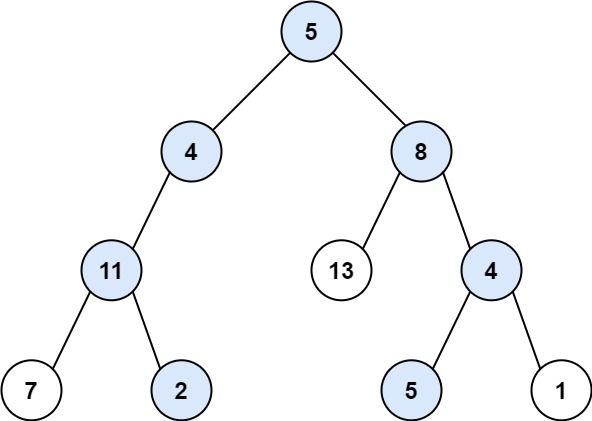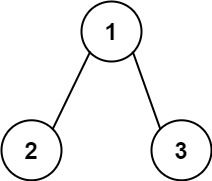给你二叉树的根节点 root 和一个整数目标和 targetSum ,找出所有 从根节点到叶子节点 路径总和等于给定目标和的路径。
叶子节点 是指没有子节点的节点。
深度优先搜索+路径记录。
# Definition for a binary tree node.
# class TreeNode:
# def __init__(self, val=0, left=None, right=None):
# self.val = val
# self.left = left
# self.right = right
class Solution:
def pathSum(self, root: Optional[TreeNode], targetSum: int) -> List[List[int]]:
def dfs(root, s):
if root is None:
return
t.append(root.val)
s += root.val
if root.left is None and root.right is None:
if s == targetSum:
ans.append(t[:])
dfs(root.left, s)
dfs(root.right, s)
t.pop()
ans = []
t = []
if root is None:
return ans
dfs(root, 0)
return ans/**
* Definition for a binary tree node.
* public class TreeNode {
* int val;
* TreeNode left;
* TreeNode right;
* TreeNode() {}
* TreeNode(int val) { this.val = val; }
* TreeNode(int val, TreeNode left, TreeNode right) {
* this.val = val;
* this.left = left;
* this.right = right;
* }
* }
*/
class Solution {
private List<List<Integer>> ans;
private List<Integer> t;
private int target;
public List<List<Integer>> pathSum(TreeNode root, int targetSum) {
ans = new ArrayList<>();
t = new ArrayList<>();
target = targetSum;
dfs(root, 0);
return ans;
}
private void dfs(TreeNode root, int s) {
if (root == null) {
return;
}
t.add(root.val);
s += root.val;
if (root.left == null && root.right == null) {
if (s == target) {
ans.add(new ArrayList<>(t));
}
}
dfs(root.left, s);
dfs(root.right, s);
t.remove(t.size() - 1);
}
}/**
* Definition for a binary tree node.
* struct TreeNode {
* int val;
* TreeNode *left;
* TreeNode *right;
* TreeNode() : val(0), left(nullptr), right(nullptr) {}
* TreeNode(int x) : val(x), left(nullptr), right(nullptr) {}
* TreeNode(int x, TreeNode *left, TreeNode *right) : val(x), left(left), right(right) {}
* };
*/
class Solution {
public:
vector<vector<int>> ans;
vector<int> t;
int target;
vector<vector<int>> pathSum(TreeNode* root, int targetSum) {
target = targetSum;
dfs(root, 0);
return ans;
}
void dfs(TreeNode* root, int s) {
if (!root) return;
t.push_back(root->val);
s += root->val;
if (!root->left && !root->right && s == target) ans.push_back(t);
dfs(root->left, s);
dfs(root->right, s);
t.pop_back();
}
};/**
* Definition for a binary tree node.
* type TreeNode struct {
* Val int
* Left *TreeNode
* Right *TreeNode
* }
*/
func pathSum(root *TreeNode, targetSum int) [][]int {
ans := [][]int{}
t := []int{}
var dfs func(root *TreeNode, s int)
dfs = func(root *TreeNode, s int) {
if root == nil {
return
}
t = append(t, root.Val)
s += root.Val
if root.Left == nil && root.Right == nil && s == targetSum {
cp := make([]int, len(t))
copy(cp, t)
ans = append(ans, cp)
}
dfs(root.Left, s)
dfs(root.Right, s)
t = t[:len(t)-1]
}
dfs(root, 0)
return ans
}

